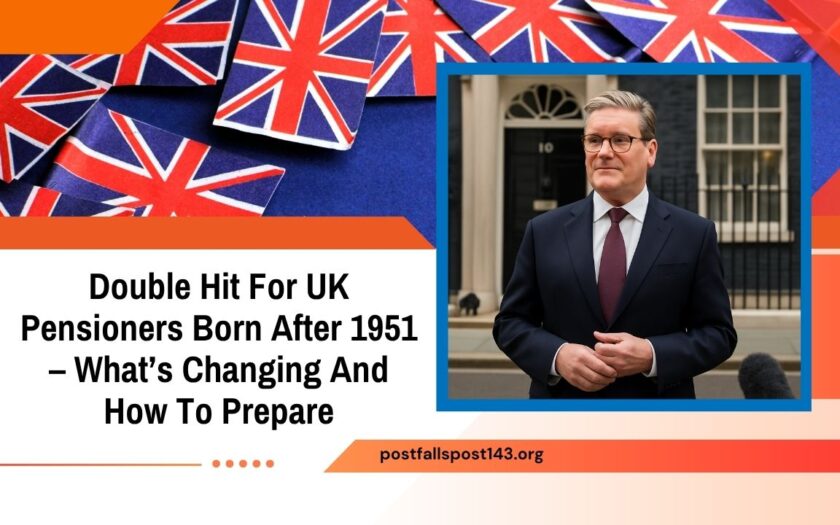In July 2025, millions of UK pensioners born after 1951 are grappling with two major financial changes that are impacting their retirement income. A combination of contracted-out pension recalculations and the ongoing freeze in the personal tax allowance is reducing take-home pension income for many retirees.
If you were born between 1952 and 1960, you may be directly affected. This article breaks down what’s changing, who is impacted, and how to safeguard your financial future.
Contracted-Out National Insurance Years Under Scrutiny
From 1978 to 2016, many UK workers participated in contracted-out workplace pension schemes, opting out of the State Earnings-Related Pension Scheme (SERPS) in exchange for paying lower National Insurance (NI) contributions.
What’s Changing?
The Department for Work and Pensions (DWP) is now using stricter methods to calculate contracted-out deductions, impacting how much new state pension retirees receive.
- Many pensioners expecting the full rate of £236.90/week may receive £10–£20 less per week, depending on how long they were contracted out.
- For example, a pensioner expecting £236.90/week might only receive £216, due to revised deductions.
Frozen Tax Allowance Creates Tax Trap
Since 2021, the personal income tax allowance has remained at £12,570. At the same time, state pensions have risen thanks to the triple lock policy, which guarantees increases based on inflation, earnings, or 2.5%—whichever is highest.
Result: More Pensioners Are Being Taxed
Here’s how the math works out:
| Type of Pension | Weekly Rate (2025) | Annual Income |
|---|---|---|
| New State Pension | £236.90 | £12,319 |
| Full Basic State Pension | £181.40 | £9,443 |
| Combined Total Income | £21,762 | |
| Tax-Free Allowance | £12,570 | |
| Taxable Income | £9,192 | |
| Estimated Tax Owed | £1,800+ |
As pensions increase but the tax-free threshold stays the same, more retirees are falling into the taxable bracket, shrinking their net income.
Who Is Most Affected?
The impact of these changes varies by birth cohort, depending on NI contributions and pension growth.
| Birth Years | Pension Reduction from Contracted-Out Years | Tax Burden Due to Allowance Freeze |
|---|---|---|
| 1952–1955 | High | Moderate |
| 1956–1960 | Moderate | High |
- Early 1950s pensioners face larger cuts from the contracted-out adjustment.
- Younger pensioners (1956–1960) are seeing steeper tax bills due to rising pensions.
How to Prepare and Protect Your Pension
Though these changes are significant, there are strategies you can adopt to manage the financial impact:
Check Your State Pension Forecast
- Visit the Gov.uk portal to view your expected payments and verify NI records.
- Spot gaps or errors that may lower your entitlements.
Top-Up Your NI Contributions
- If you have missing or reduced NI years, you may be eligible to purchase Class 3 voluntary contributions to boost your pension.
Seek Tax Advice
- A tax advisor can help you plan to reduce taxable income:
- Split retirement income between spouses
- Defer part of your pension
- Use ISAs or other non-taxable income streams
Apply for Pension Credit
- If your retirement income is low, you may qualify for Pension Credit, which not only boosts income but may unlock access to:
- Housing Benefit
- Council Tax support
- Cold Weather Payments
Is Help on the Way?
While advocacy groups are urging the government to:
- Recalculate contracted-out deductions
- Raise personal tax allowances for pensioners
No official relief has been announced yet. However, potential changes may be introduced during the Autumn Statement or Spring Budget, so it’s crucial to stay informed.
| Factor | Detail |
|---|---|
| Contracted-Out Recalculation | Reduces pension by £10–£20/week for many retirees |
| Personal Tax Allowance Freeze | Still fixed at £12,570 despite higher pension payments |
| Most Affected Birth Cohort | Born between 1952–1960 |
| Potential Annual Tax Due | Over £1,800 for those receiving both state pensions |
| Mitigation Options | NI top-ups, tax planning, Pension Credit |
UK pensioners born after 1951 are facing a double financial blow in 2025: reduced state pensions from contracted-out NI years and higher tax liabilities due to the frozen personal allowance.
These changes may come as a shock to many retirees. However, by proactively checking your pension forecast, exploring NI top-ups, and seeking tailored tax advice, you can take back control and minimize the financial impact.
FAQs
Why is my state pension lower than expected in 2025?
If you were part of a contracted-out pension scheme, your National Insurance contributions were reduced, which can lower your final state pension amount under the new DWP calculations.
Will all of my state pension be taxed now?
Not necessarily, but as the state pension rises and the tax-free allowance remains frozen, a larger portion may become taxable, especially if you receive other income.
Can I still increase my state pension after retiring?
Yes. You can buy back missing NI years (Class 3 contributions) to potentially boost your pension, even after retirement, depending on your eligibility.

